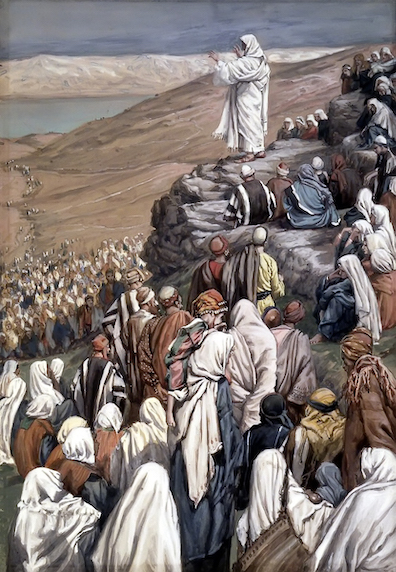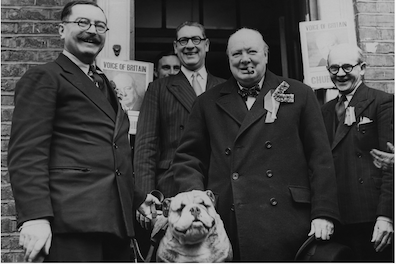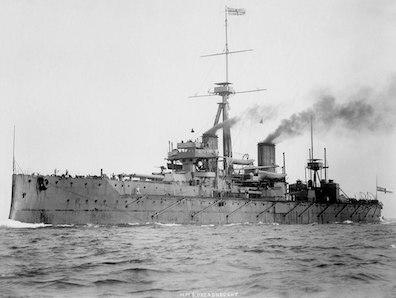The young men tramping to Burke's pub beat time with a
cacophonous medley of martial anthems. Mulligan's erudite
"Thence they advanced five parasangs" sets the tone,
and then various popular songs break out: the Irish "Slattery's
mounted foot," the French "Ma mère m'a mariée,"
the American "Tramp, tramp, tramp," and
finally "God Save Ireland" sung to the American tune. Less
musical, but appropriately rhythmic, are the alliterative
"British Beatitudes!" Eight articles of English faith are
enumerated, matching the eight Beatitudes of Christ's Sermon
on the Mount and thereby mocking not just British
imperialism but also Christian religion. The brilliantly
funny conceit is Joyce's own. It could be spoken by either
Stephen or Mulligan, but Stephen is the far more likely
culprit.
In Christian tradition the Beatitudes are eight sayings from
the Sermon on the Mount that Jesus preaches in Matthew:
"Blessed are the poor in spirit: for theirs is the kingdom of
heaven. / Blessed are they that mourn: for they shall be
comforted. / Blessed are the meek: for they shall inherit the
earth. / Blessed are they which do hunger and thirst after
righteousness: for they shall be filled. / Blessed are the
merciful: for they shall obtain mercy. / Blessed are the pure
in heart: for they shall see God. / Blessed are the
peacemakers: for they shall be called the children of God. /
Blessed are they which are persecuted for righteousness' sake:
for theirs is the kingdom of heaven" (5:3-10). The Greek
plural adjective makarioi, rendered as "blessed" in
the King James English, was translated beati in the
Latin Vulgate, and Cicero's coinage beatitudo was
broadly adopted by Christians as a name for these eight
sayings. (Matthew 5:11 contains what might be counted as a
ninth beatitude, but eight is the traditionally recognized
number.)
Jesus says that people who are downtrodden and deprived will
inherit the kingdom of heaven. The British say that people
like them, defined by eight less humble principles, will
inherit the earth. Beer requires no comment. Beef:
The English are famous "beefeaters," and a large percentage of
Ireland's cattle at this time ended up as roasts on English
tables. ("Emigrants," says Mr. Power in Hades when he
sees a herd being driven to the quays.) Business: The
British empire was a supremely mercantile enterprise, deeply
intertwined with venture capitalist firms like the East India
Company and bankers like the Rothschilds. Bibles: From
the beginning Protestants proclaimed the doctrine of sola
scriptura and owned vernacular Bibles so as to receive
the word of God directly. (Catholics trusted priests to
translate the Latin for them, and few in Joyce's Ireland owned
Bibles.) Bulldogs: from cartoons in the 18th century
through propaganda posters in the Great War, "British bulldog
spirit" was an enduring cliché. Battleships: as a
small island nation with outsized economic might Great Britain
aimed from 1707 onward to "rule the waves," and in the
early 20th century it did so with massive steel
"dreadnoughts." Buggery: the view that homosexuality
was endemic in English boys' schools was widely shared and
well deserved. Bishops: The Anglican church instituted
by King Henry and Queen Elizabeth renounced allegiance to the
Pope but retained the hierarchical authority of bishops.
These eight great cognates sound several times during the
loud march to the pub. In one snippet, when the American
song's "tramping" mingles with the pounding Beatitudes,
corporeal pleasures appear to be dominating spiritual
treasures: "Beerbeef trample the bibles." When the
young men find themselves standing outside the door of the
pub, anticlerical sentiment finds new B words: "Bishops'
boosebox." Either Mulligan or Stephen may be supposed
capable of inventing such mockeries of Christian faith, but
Stephen seems the better choice for four reasons. He, not
Mulligan, is Joyce's autobiographical persona.
He is far more bitterly anti-British than Mulligan, who
studied at both Trinity College and Oxford
University. The parody of the Sermon on the Mount
appears soon after he is invited to recite his parody of the Apostles'
Creed. And when the conceit reappears in Circe,
it comes from Stephen's mouth: "Blessed be the eight
beatitudes." Eight of his ten cronies from the march in
Oxen, Mulligan among them, promptly appear as
personifications of the blessed entities, "in white
surgical students' gowns, four abreast, goosestepping."
They recite the holy names: "(Incoherently.) Beer
beef battledog buybull businum barnum buggerum bishop."
Of the commentators I have consulted, only Gifford looks for
models that might have inspired Joyce's alliterative octad. He
argues that there is "a parody of line 138, canto 1 of Pope's
The Rape of the Lock (1714), describing Belinda's
dressing table: 'Puffs, Powders, Patches, Bibles,
Billet-doux'," and also a reference to "'Beer and Bible', the
nickname of a combination of High-Church Conservatives and
English brewers who resisted Parliament's attempts to limit
the sale of intoxicating beverages in and after 1873." Both
claims seem plausible enough.


